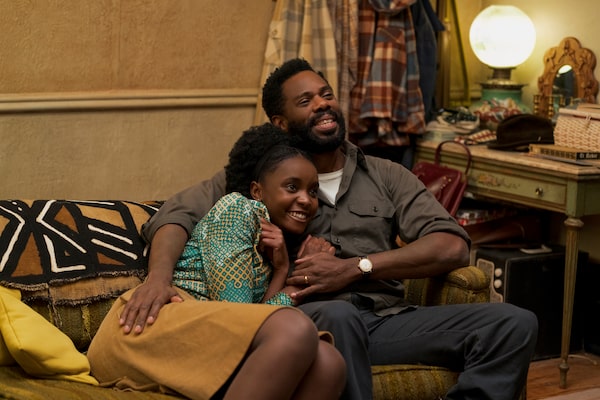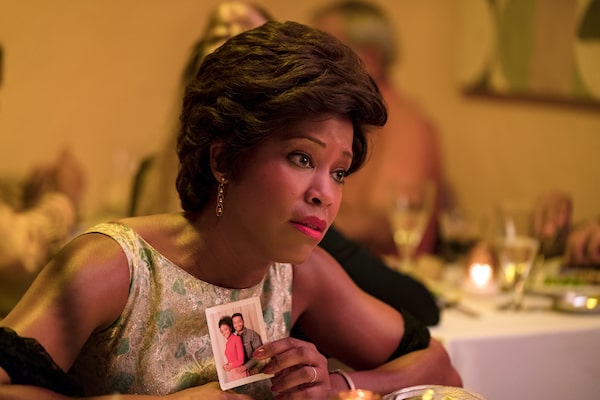
KiKi Layne, left, and Colman Domingo in a scene from If Beale Street Could Talk.Tatum Mangus/The Associated Press
- If Beale Street Could Talk
- Classification: 14A; 119 minutes
- Directed and written by Barry Jenkins
- Starring KiKi Layne and Stephan James
Barry Jenkins’s new film If Beale Street Could Talk gets rolling with a boisterous set-piece where two Harlem families discuss a forthcoming birth. It’s the early 1970s and the teenage Tish (KiKi Layne) has shyly told her parents that she is pregnant by her boyfriend Fonny (Stephan James), whom she plans to marry. They have reassured and supported her – and decided to treat the news as so joyful they call up Fonny’s parents and invite them over. Fonny’s mother, however, is a devout Christian who is horrified by the prospect of a grandchild conceived in sin, while her supercilious daughters condescend to Tish and her family.
If Fonny himself is not present it’s because he is in jail, falsely accused of raping a woman by a racist police officer. So, the living-room scene is fraught with anxiety about Tish and Fonny’s future and veers between the hope of one family and the shame of the other. It has some comic moments as Aunjanue Ellis’s big performance in the role of Fonny’s judgmental mother flirts with farce, but then her anger and the reaction it provokes takes the gathering somewhere much darker. The tonal range is typical of director Barry Jenkins’s wide emotional reach and expressive cinematography – to judge from both this sensitive film and, of course, its Oscar-winning predecessor, Moonlight.
Again Jenkins has turned to a literary text as source material for a story that humanizes African-American experience in a very specific setting. Moonlight was based on Tarell McCraney’s play about a boy growing up gay in Miami during the crack epidemic of the 1980s; Beale Street is based on James Baldwin’s 1974 novel about black family life and love in what was then contemporary Harlem, in the immediate aftermath of the civil rights era. Although its protest against an oppressive system is as relevant as ever, it is not a politically current novel, specifically in its attitude toward its female characters: The story is narrated by the demure and deferential Tish stoically defending her man. Layne’s performance is deeply impressive in that regard, turning a previous generation’s ideal of womanhood into a real person, delicate rather than sappy, whose youthful timidity is overwhelmed by her love for Fonny.

Regina King plays Tish's mother in If Beale Street Could Talk.Tatum Mangus/The Associated Press
James’s battered Fonny is effective at relaying the depths of the man’s love and hurt, but still there is more of the couple’s youthful romance, told in a complex structure of flashbacks, than the viewer needs, and the film drags in middle sections because of it. Meanwhile, a subplot about Tish’s mother (an excellent Regina King) chasing off to Puerto Rico to see if she can reach the woman who has accused Fonny feels like padding. (The episode is included in the original novel; one of Jenkins’ challenges in adapting Beale Street is how to treat the woman and her false accusation.)
Much more quietly convincing are scenes where the male characters discuss what it is to be a black man in America; the flashbacks include one piece of foreshadowing where Fonny’s recently released pal (Brian Tyree Henry) tells him what he experienced in jail; there is a later moment where the young couple’s two fathers (Colman Domingo and Michael Beach) discuss what they do to keep their families together. Like Moonlight before them, the scenes are heart-breaking indictments of the way a racist system deforms men’s character.
Baldwin ended the novel in mid-story, without a final resolution to Fonny’s plight; perhaps sensing that contemporary movie audiences demand closure, Jenkins does provide something more conclusive. Like that first scene, it is an ending that positions itself between genres, leaving the characters in a situation that is neither fully happy nor completely disastrous. It’s a gesture of emotional realism with which Jenkins again reveals how both familial and romantic love hold tragedy at bay.
 Kate Taylor
Kate Taylor